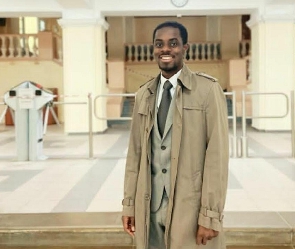Opinions of Monday, 2 October 2023
Columnist: Simon Badu
Unraveling the mystery of epilepsy: Understanding and empowering lives
In our bustling and diverse communities, many individuals silently battle health
conditions that often go unnoticed or misunderstood. One such condition that affects millions worldwide, including our neighbors, is epilepsy. Epilepsy is a neurological disorder characterized by recurring seizures, and we must understand its causes, symptoms, and treatments to ensure those affected can lead fulfilling lives.
Epilepsy is not a single disease but a group of disorders that affect the brain's electrical activity. Seizures, the hallmark of epilepsy, can take many forms and have varying degrees of intensity. Some seizures may involve a person
staring blankly for a few seconds, while others can result in convulsions, loss of consciousness, and even injuries. Epilepsy is a complex condition with numerous potential causes, often varying from person to person. However, its impact is often more profound among individuals living in poverty and marginalized communities.
In this article, we explore the intersection of epilepsy treatment and spirituality, highlighting the challenges faced by vulnerable populations and the need for equitable access and a balanced approach to care. Some common causes include genetic factors, brain injuries, infections, and more. Diagnosis and treatment typically involve medical professionals, diagnostic tests, and medications. Diagnosing epilepsy requires a thorough evaluation by a medical professional. This typically involves a detailed medical history, physical
examinations, and sometimes brain scans like EEG (Electroencephalogram) or MRI (Magnetic Resonance Imaging).
Early diagnosis is crucial, as it allows individuals to access proper treatment and support. The good news is that epilepsy is a manageable condition in many cases.
Treatment options include Medications: Antiepileptic drugs (AEDs), Lifestyle Modifications, Surgery, and Dietary Therapies. While spirituality can be a valuable source of support, it should not be a substitute for medical treatment. In Ghana, some individuals may struggle to balance their spiritual beliefs with the necessity of taking medications or following medical advice.
Misconceptions about epilepsy persist in our society, often rooted in superstition or religious beliefs. These misconceptions can lead to stigma and discrimination, making it challenging for individuals with epilepsy to fully engage in their spiritual communities. The intersection of epilepsy, prayer, evil spirits, and science is a complex and sensitive topic. It involves the
the confluence of religious and spiritual beliefs, medical science, and cultural traditions.
Prayer is a fundamental aspect of many religious and spiritual traditions around the world. People often turn to prayer for comfort, guidance, and strength during difficult times, including when facing health challenges like epilepsy. For many individuals and communities, prayer is an integral part of their coping mechanisms and emotional support system. In some cultures especially ours,
epilepsy has been historically associated with evil spirits, curses, or supernatural causes.
These beliefs can lead to stigmatization, discrimination, and social isolation for individuals with epilepsy. It is crucial to recognize that these cultural beliefs are rooted in a lack of understanding of the medical aspects of epilepsy and should not be used to justify harm or discrimination.
Navigating the intersection of epilepsy, prayer, evil spirits, and science requires a nuanced and balanced approach: medical treatment, spiritual support, education and awareness, and cultural sensitivity.
Epilepsy is a condition that affects people irrespective of their socioeconomic status, but its impact is magnified among individuals living in poverty. Ensuring equitable access to epilepsy treatment is not only a matter of healthcare but also of social justice. By addressing the challenges faced by vulnerable communities, raising awareness, and advocating for change, we can work towards a future where epilepsy does not perpetuate the cycle of poverty, and all individuals have the opportunity to lead healthier and more fulfilling lives.
While medical science provides a comprehensive understanding and treatment of epilepsy, individuals often turn to their spiritual beliefs for emotional support and coping mechanisms. Cultural beliefs about evil spirits should be approached with respect and understanding, recognizing that education and awareness are essential to dispel harmful stereotypes. Ultimately, a balanced
approach that respects an individual's spiritual beliefs while prioritizing evidence-based medical treatment is crucial to ensuring the well-being of those living with epilepsy.
By fostering understanding and empathy within our communities, we can help individuals with epilepsy lead fulfilling lives free from stigma and discrimination. It is crucial to rely on scientific and medical understanding when discussing and addressing epilepsy. Today, we have a comprehensive
understanding of epilepsy's causes, diagnosis, and treatment through the field of neurology and medical research.
Modern medicine offers effective treatments, including antiepileptic drugs and medical interventions, to manage the condition and improve the quality of life for individuals with epilepsy. Promoting accurate information and dispelling misconceptions about epilepsy is essential to combat stigma, ensure proper medical care, and support individuals living with the condition. Encouraging open dialogue, education, and empathy can contribute to a more inclusive and informed society regarding epilepsy and other neurological disorders.
Epilepsy and spirituality intersect in complex ways, offering both challenges and opportunities for individuals on their journey with the condition. In conclusion, while spirituality can be a source of strength, comfort, and resilience, it is essential to approach the relationship between epilepsy and
spirituality with awareness and a balanced perspective. Ultimately, the spiritual path chosen by each individual should align with their beliefs, values, and the guidance of their healthcare team, fostering holistic well-being and a sense of connection to themselves, their communities, and the greater universe.













